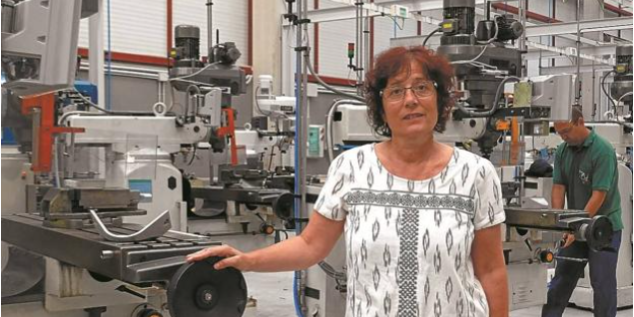Iosune Irazabal is a mechanical engineer at the University of Mondragon. She started her career at the CIFP Miguel Altuna in 2001 where she held different positions as part of the centre’s management team, seven of which as Director (until September 2020). While being Director of CIFP Miguel Altuna, she was also the president of Ikaslan Gipuzkoa (Association of Public Vocational Training Centers of Gipuzkoa) for three years. She has always liked to face changes and get out of her comfort zone, so now she has embarked on promoting digitization within the CIFP Miguel Altuna.
“When the opportunity to be part of this COVE arose through Tknika, as director I had no doubt that it would mean a chance for CIFP Miguel Altuna to promote excellence within its centers. Two years later I can say that the opportunity has become a reality, but now we have to keep moving forward, the wheel can not stop, vocational training must always be innovating as an agent that drives competitiveness and talent.”
What does the Advanced manufacturing sector represent for the Basque Country?
The Basque Country is a small territory but with a great entrepreneurial spirit, in fact the industrial GDP accounts for 24.2% of its total. Due to the entrepreneurial spirit of the Basque society, there is a high number of micro-SMEs which counts for 93.17% of companies according to Confebask (data from 2019). The Basque industrial environment can not be analysed without highlighting the importance of Advanced Manufacturing. It represents nowadays 21% of GDP and 20% of employment rates. For this reason, there is a government strategy entitled Basque Industry 4.0. within the Regional Smart Specialisation Strategy (RIS3), which objective is for the Basque Country be a competitive territory in the era of globalization.
As former Director of Miguel Altuna, what do you think that participating in a CoVE project brings to the organisation, to the Basque VET system and to your region?
There is a refrain that says that ‘alone you will go faster but accompanied you will go further’. The Cove are an example of this, they are an opportunity to advance the excellence of each vocational training center but sharing the experience of an entire community with the added value that ecosystems are created around a strategic sector. VET centers have their raison d’être in generating talent but to achieve excellence in that generation of talent they must promote sustainability and support inclusiveness by focusing on human capital. Therefore we have to be in continuous evolution and lifewide learning. Coves are a tool that drive this evolution, they are an opportunity for improvement. The centres of excellence are a lever of change for the rest of the Vocational Training centers in the Basque Country, since they represent a reference in the sector that can help them to advance and generate synergies.
How could you convince other Basque VET centres to participate in CoVEs?
The VET centers have a social responsibility to advance and generate new training to improve both technical and transversal skills as the world moves forward. In this context, the Cove is an opportunity to share and generate knowledge within the organization. CoVEs serve to look to the future and anticipate the needs that arise in a certain strategic sector in cooperation with other VET centers. The idea on which the COVEs are based of adding value to regional knowledge ecosystems through collaboration with international ecosystems seems to me to be a very enriching approach. To prepare the future, we must work in the present and cooperation stands out as an asset that makes us strong.
The project is named Excellent Advanced Manufacturing 4.0. What does “excellence” mean to you?
If we stick to its meaning, excellence is a word that should be written in CAPITAL LETTERS. In this case the meaning goes beyond the word itself, it means putting into practice organizational systems that guarantee the fulfillment of the commitments made to society (students, workers and non-workers, companies, society…) with the required quality, in a transparent manner, ensuring people’s welfare and sustainability and where the center is the person, so promoting social inclusion.
How do you see EXAM 4.0’s sustainability and exploitation taking place?
In the era of digital transformation, connectivity and the 4th industrial revolution, the sustainability and exploitation of the project is guaranteed as long as we are able to transfer the results of the project to our environments and as long as we are able to embed it in VET centers’ daily activities. EXAM 4.0 is not an isolated project but a concept about way of working, we are talking about an ecosystem around advanced manufacturing and as such it must be integrated into the centers’ different areas of work.
Discover other initiatives by Miguel Altuna
→ ADMIC: Assessing Digital Maturity in Colleges (2021-2023)
→ DigitalVET: with the aim of boosting the digital transformation of the organization (2021-2023)



